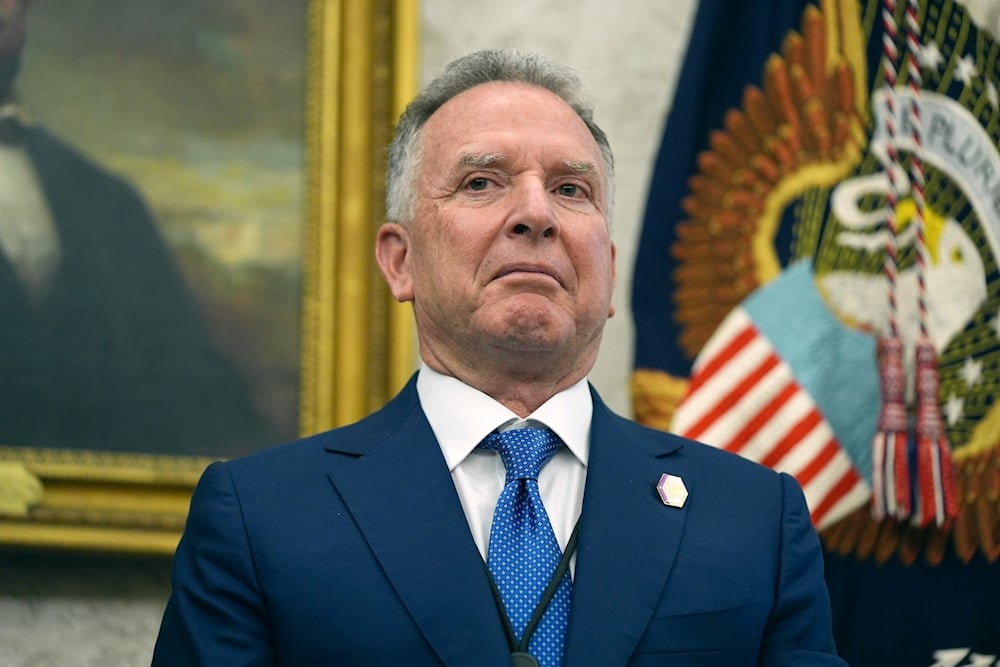US proposes 'bridge' plan to extend Gaza ceasefire
This comes amid heightened tensions between "Israel" and Hamas, as the occupation's ban on aid entering Gaza enters its 10th day, and as "Israel" refuses to move on to the second phase of the ceasefire deal.
-
 Steve Witkoff, special envoy, watches as President Donald Trump signs executive orders in the Oval Office of the White House in Washington, February 3, 2025 (AP)
Steve Witkoff, special envoy, watches as President Donald Trump signs executive orders in the Oval Office of the White House in Washington, February 3, 2025 (AP)
The United States has put forward a "bridge" proposal aimed at extending the ceasefire in Gaza through April, beyond Ramadan and Passover, to provide additional time for negotiating a permanent end to the war, the White House announced in a statement on Friday.
According to a statement from their offices, the proposal was presented on Wednesday by US special envoy Steve Witkoff and National Security Council official Eric Trager.
The White House accused Hamas of making "entirely impractical demands" and stalling a deal that would see the extension of the ceasefire in Gaza in return for the release of a US-Israeli captive.
"Hamas is making a very bad bet that time is on its side. It is not," said the statement.
"Hamas is well aware of the deadline, and should know that we will respond accordingly if that deadline passes," it pointed out, emphasizing Trump's previous vows that Hamas would "pay a severe price" for not releasing the captives.
The statement indicated that "Hamas was told in no uncertain terms that this 'bridge' would have to be implemented soon- and that dual US-Israeli citizen Edan Alexander would have to be released immediately," adding, "Unfortunately, Hamas has chosen to respond by publicly claiming flexibility while privately making demands that are entirely impractical without a permanent ceasefire."
The Palestinian group announced earlier on Friday that it was prepared to release an Israeli-American captive along with the remains of four others, following the resumption of indirect Gaza ceasefire talks with "Israel".
This closely follows direct talks between Hamas and the United States, where the US envoy to Hamas Adam Boehler said his meetings with Hamas were "very helpful," as "Israel" tightens its siege on Gaza.
US, Hamas discuss release of dual-nationality captive
Senior Hamas official Taher al-Nono told Reuters on March 9 that recent meetings between Hamas leaders and US captives negotiator Adam Boehler have primarily focused on the release of an American-Israeli dual national held by the group in Gaza.
Al-Nono, political advisor to the leader of Hamas, confirmed the direct talks with the US, noting that they had occurred over the past week in the Qatari capital, Doha.
"Several meetings have already taken place in Doha, focusing on releasing one of the dual-nationality prisoners. We have dealt positively and flexibly, in a way that serves the interests of the Palestinian people," al-Nono pointed out.
He further explained that both sides had also addressed how to implement the phased agreement aimed at ending the war on Gaza.
"We informed the American delegation that we don't oppose the release of the prisoner within the framework of these talks," the Palestinian official noted.
Trump's special envoy, Steve Witkoff, emphasized last week that securing the release of Edan Alexander, a 21-year-old from New Jersey believed to be the last remaining American captive held by Hamas in Gaza, was a "top priority".
Alexander, who served as a soldier in the Israeli occupation military, has been in captivity since the outbreak of the war.
On March 8, "Israel" and Hamas indicated they were preparing for the next phase of ceasefire talks, with mediators working to extend the fragile 42-day truce that began in January.
On March 9, "Israel's" Energy Minister, Eli Cohen, announced that he had instructed the Israel Electric Corporation (IEC) to cease electricity sales to Gaza, a move he claimed was aimed at pressuring Hamas to release captives.
However, the measure is unlikely to have an immediate impact, as "Israel" had already cut off the power supply to Gaza at the start of the war. It could, however, affect a wastewater treatment plant currently relying on the supply.
Al-Nono praised Witkoff for his significant role in securing the ceasefire agreement on January 19 that brought an end to the war on Gaza.
"We hope that he (Witkoff) will work to succeed in the negotiation of the second phase," he concluded.

 4 Min Read
4 Min Read










